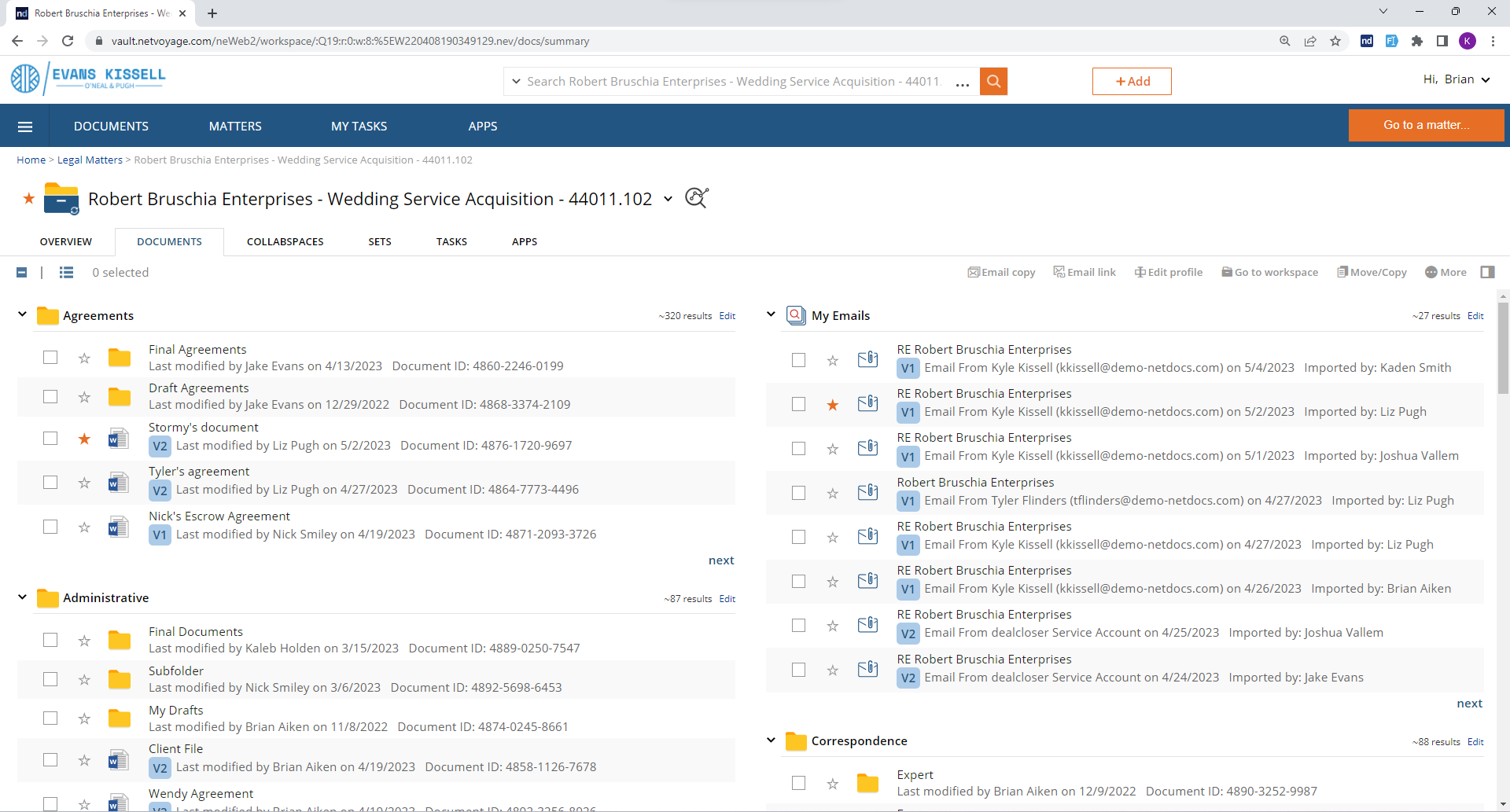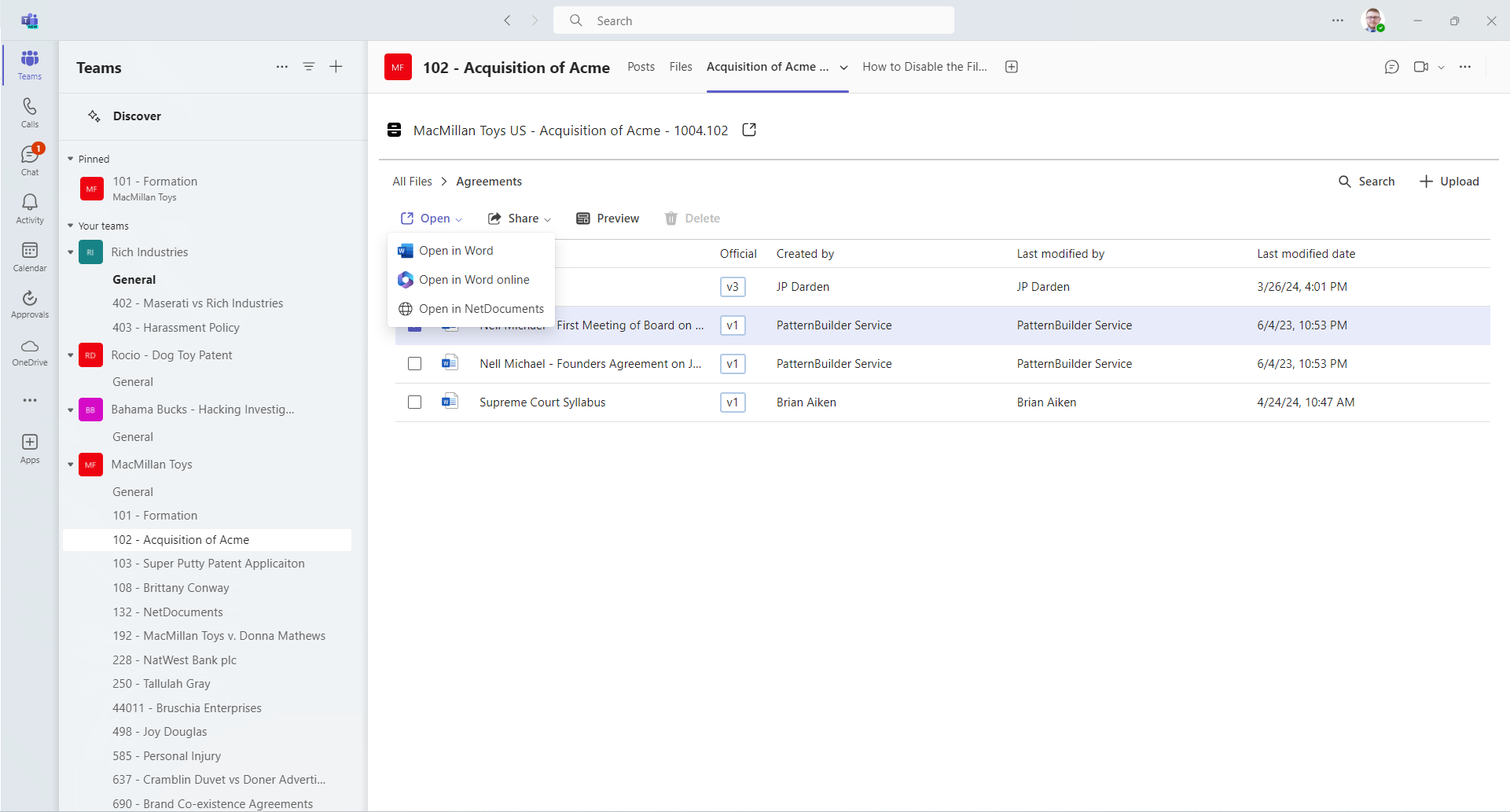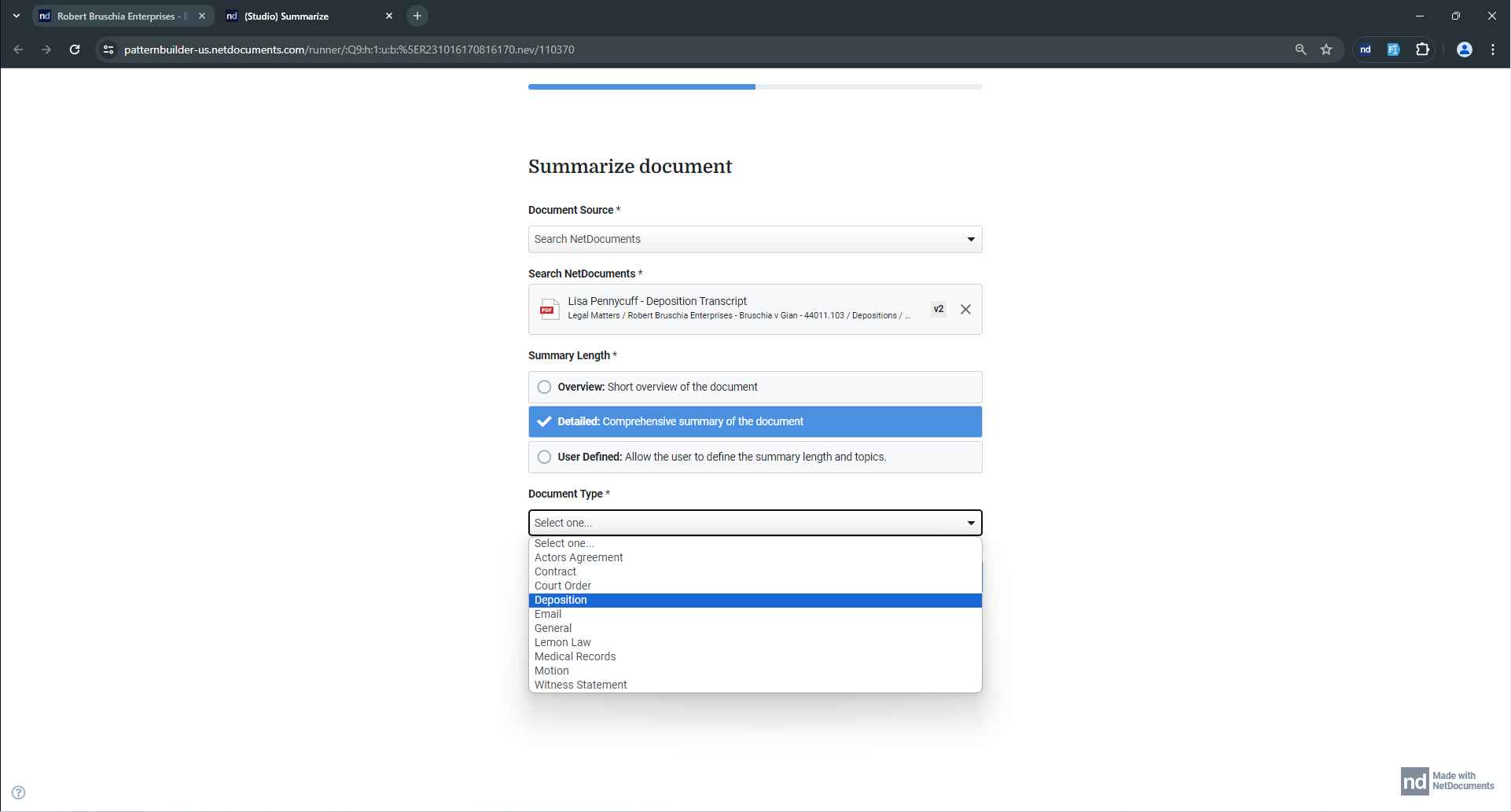NetDocuments Adds To Areas Where Legal Professionals Do Their Best Work
NetDocuments provides a cloud-native, matter-centric DMS that delivers a single system of record for securing, organizing, automating, and collaborating on documents related to matters in workspaces.

Image courtesy of NetDocuments.
Lawyers use multiple applications, but switching tools and contexts is inefficient, consuming time and mental energy. NetDocuments’ legal-specific document management system (DMS) meets legal professionals where they work, such as in Microsoft Outlook, Teams, and Word, significantly reducing the burden of switching back and forth between these applications and NetDocuments DMS.
NetDocuments provides a cloud-native, matter-centric DMS that delivers a single system of record for securing, organizing, automating, and collaborating on documents related to matters in workspaces. See Figure 1.

Figure 1: NetDocuments organizes matter workspaces into functional tabs providing external collaboration and document sharing (CollabSpaces), binder generation with SetBuilder (Sets), document and task management (Tasks), and automation (Apps) within the DMS.
NetDocuments embraces Microsoft’s vision of the future of work and lawyers’ experience working in Microsoft 365 using collaborative tools and artificial intelligence (AI).
The Future of Work: Collaboration and Artificial Intelligence
NetDocuments complements how lawyers collaborate in Teams digital workspaces and Outlook email. Without leaving Teams and Outlook, lawyers can use the Microsoft Copilot integration to make natural language search requests and receive results linked to content stored in the NetDocuments DMS.
NetDocuments’ Teams app seamlessly integrates with Teams, reducing the time spent toggling between applications and improving productivity, security, and collaboration. It uses NetDocuments’ trusted security to access documents in the DMS and make notes, all within Teams.
Teams’ users generally pull documents from their source of truth and copy them into Teams to share work, which creates data governance concerns in access controls and duplication. But that’s not the case with NetDocuments. Users can query the DMS from within Teams, and NetDocuments checks a user’s access permission before it loads document views and provides access to documents. Before opening a document to edit, you can view document versioning information, access permissions, and make margin notes separate from the document that safeguards your notes if the document is shared with a client or another person outside the firm.
Users can link a team or channel to a specific workspace or location in NetDocuments. As a member of the Microsoft Cloud Storage Partner Program (CSPP) and Cloud Storage Partner Program Plus (CSPP+), NetDocuments is one of a select few vendors to offer deep interoperability with Microsoft 365, enabling features like native co-authoring. See Figure 2.

Figure 2: With a view from Teams into a NetDocuments workspace, you can open a document in Word, NetDocuments, or Word Online to co-edit.
You can use ChatLink for Teams to send channel posts to message threads (Thread) in a corresponding matter workspace. If you delete or remove a Team, the communications record remains intact in NetDocuments. Within Teams, search NetDocuments for the content to review and collaborate with Margin Notes.
Margin Notes allows you to edit and comment on a document collaboratively without the need to edit directly in the document. This avoids the “checkout wars,” version conflicts, and other challenges that arise when teams need to collaborate on a document in real time. Open a document in Teams and review and comment on it in Margin Notes. The notes provide an ongoing discussion by the editors. You can view the Margin Notes in Teams or NetDocuments and review and comment in real time, regardless of your interface.
Microsoft is moving from COM-based add-ins to lightweight web-based add-ins, and NetDocuments is moving in tandem. With NetDocuments’ new web-based integration with Outlook, NetDocuments predictive email filing uses AI to predict filing locations and drive recommendations. NetDocuments crowdsources the firm’s filing habits and knows where lawyers file documents. While filing, you can retitle the file so it’s easy to find and modify access rights, such as if you need to mark it for your eyes only.
NetDocuments can automatically file incoming and outgoing replies to an original message when you engage in conversation filing. With outgoing emails, NetDocuments’ file and attachment management in Outlook lets you attach files. You have different options to attach or share files, send a link, or secure a link. The same mail-filing experience, file attachment, and sharing features are available on Outlook mobile.
File Sharing and CollabSpaces
Users can set up a secure workspace or CollabSpace and drag and drop folders and files into them to share. A matter workspace can support multiple CollabSpaces as subsets of a matter. Shared content is not replicated but stays in one place, making governance straightforward. Access rights remain consistent with the organization’s compliance requirements, and the system tracks and logs all file access and changes.
A firm can prevent file sharing by applying data loss prevention (DLP) policies to content and data classifications. Using special DLP rules, firms can prevent users from attaching DMS content to an email or adding it to a CollabSpace. DLP can prohibit users from modifying, copying, or printing files stored in the DMS. The rules can also prohibit syncing documents with ndSync and stop users from delivering secure links to documents.
Purpose-Built AI Apps
NetDocuments has purpose-built, generative AI apps that work on documents and email messages in the DMS. With PatternBuilder MAX, you can build, configure, and use generative AI in specific workflows for individuals, teams, or the entire firm.
PatternBuilder MAX enhances NetDocuments’ built-in, no-code document assembly and workflow capabilities by allowing firms to create custom generative AI prompts and automation tailored to the needs of specific practice areas and legal tasks.
PatternBuilder MAX leverages Microsoft Azure OpenAI to enable secure and responsible use of the latest large language models (LLM) like GPT 4 while keeping confidential documents and data secure within the NetDocuments platform. Nine purpose-built Studio Apps come with PatternBuilder MAX, which provides a starting point for large law firms to develop unique workflows and perhaps an endpoint for smaller firms that might use the apps without modification. The Studio Apps have the capabilities to:
- Generate a summary of a document in NetDocuments. Users can generate a general summary or apply a summary template for specialized use cases (depositions, loan agreements, etc.). See Figure 3.
- Automatically draft a new document, allowing users to select a prior precedent document as an example or draft a document from scratch based on custom instructions. This can include analyzing a patent application rejection letter and writing an appropriate appeal, taking a fact sheet and drafting a new lease, or rejections to demand letters.
- Automatically extract information from documents and store the resulting data in a relational database to facilitate analysis or drive subsequent automations. This app is ideal for identifying and storing contract data.
- Instantly analyze an agreement or other document based on the selected contract playbook, including organization-specific contract playbooks that analyze any type of desired agreement. The analysis identifies aspects of the document that do not align with the selected playbook, provides context, and makes recommendations as to how best to ensure the document conforms to the playbook.
- Generate a timeline of events based on the selected text.
- Automatically translate text from one language into another, supporting over a dozen languages.
- Compare two documents based on custom criteria that the user provides.
- Quickly draft the next section of a document based on prior content in the document. Optionally, users can include prior precedents to enhance the quality of the draft further.
- Ask one or more plain-language questions about a document stored in NetDocuments, ensuring quick answers even when the information is buried in lengthy, complex documents.

Figure 3: Configure PatternBuilder MAX Studio Apps to summarize documents by selecting the summary length and document type.
PatternBuilder MAX, the first product available from the ndMAX suite, connects to Microsoft’s Generative AI, but you are not using a free-form chat interface. You control the input, system, user message, the model used, and the context window.
Maintaining the security and confidentiality of your documents and data is a critical element of the responsible application of generative AI in legal. With PatternBuilder MAX, not only is your information not used to train Microsoft’s LLMs, NetDocuments and Microsoft have a zero-day content retention policy on AI, which means Microsoft retains neither your input nor output.
Additionally, NetDocuments is one of a small number of providers to have secured an exemption to Microsoft’s abuse monitoring policy. This exemption ensures neither inputs to nor outputs from Microsoft’s LLM AI are subject to systematic or human oversight by Microsoft. Additionally, firms and departments can set up ethical walls to control the matters and clients for which generative AI-powered applications can be used and make policy-oriented decisions around the use of AI applications by individuals, such as first-year associates.
If you don’t use PatternBuilder MAX, NetDocuments still provides PatternBuilder, a no-code document automation environment to create custom Microsoft Word or PDF documents from user input, such as form-filled or database-driven questionnaires and surveys with variables to store user input. The output document, such as an intake form or retainer agreement, can trigger a workflow or add to an existing flow using Microsoft Teams, Microsoft Power Automate, or NetDocuments’ tasks and notifications.
To simplify and enhance your workflows, you don’t have to leave NetDocuments to create tasks for associates and staff. In the tasks tab of a matter workspace, create assignments in message format, as if you were in Threads, using an “@” mention and include links to documents from the DMS without making a copy. Review assigned tasks, comments, status, and details in list views or Kanban-style boards, such as due dates and checklists.
Legal professionals often create documents from multiple files in tedious and time-consuming processes. Whether they work in M&A, real estate, or criminal law, lawyers and staff make deal bibles, closing binders, trial exhibits, witness packages, electronic court filing packages, and more. SetBuilder collects and organizes documents of various file formats and email messages into a zipped file or a single consolidated PDF, complete with a cover page, a hyperlinked table of contents, and bookmarks for sharing and collaborating.
An Intelligent AI Assistant
The latest release in the ndMAX suite of AI tools is an intelligent assistant that enables users to interact with NetDocuments through natural language commands and queries to find information, answer questions in documents, create summaries, and easily draft responses or revisions to content. It also includes a Microsoft Copilot integration, enabling users to submit queries to Copilot which can reach into NetDocuments while respecting relevant content permissions, ethical walls, and other organization-specific security measures, when generating a response.
NetDocuments: A Versatile Platform
NetDocuments supports an open application programming interface (API) to connect data sources and systems with the DMS. Customers access over 500 integrated applications within the platform weekly, including its deep penetration into Microsoft Teams, Outlook, and Word. You can choose from more than 150 apps in NetDocuments’ App Directory.
For example, DocuSign eSignature integration makes it easy to collect a signature by right-clicking any document in the DMS, and PacerPro integrates with NetDocuments to store and track federal filings in their respective workspaces with custom document profiles using PACER metadata.
Pricing
NetDocuments and its channel partners sell the software monthly per user with added costs depending on implementation requirements and additional software modules and apps, such as PatternBuilder MAX, which uses a predictable subscription model.
Who is NetDocuments?
NetDocuments, a leading cloud-based content management and productivity platform, is a versatile and trusted partner to legal professionals. With a strong foundation of 25 years in cloud innovation, NetDocuments offers a complete end-to-end document and email organization and management platform. It features robust security, collaboration, search technologies, seamless integrations with software professionals use daily, and automation and AI capabilities that ensure the security and guardrails to manage AI responsibly. Over 7,000 law firms, corporate legal departments, and public sector entities globally rely on the versatility and capabilities of NetDocuments.
Latest Developments and Updates
- PatternBuilder MAX includes out-of-the-box apps with generative AI to address common legal use cases and a no-code app builder to allow users to customize pre-built apps or build their own bespoke apps to address even the most complex or unique documents and workflows.
- Legal professionals can easily find documents and information within
- NetDocuments DMS from directly inside Teams and Outlook using the Microsoft Copilot integration.
- NetDocuments enhanced its web-based integrations and filing experience within Microsoft Outlook and Outlook mobile.
- NetDocuments’ Teams app experience provides a seamless look and feel, trusted security, and an ability to access documents from within NetDocuments.
Why Buy NetDocuments?
- NetDocuments is a legal-specific DMS that meets legal professionals where they work, such as in Microsoft Outlook, Teams, and Word.
- Access documents in NetDocuments DMS securely from inside Teams and collaborate and comment on documents without opening them in Word.
- Automate everyday law firm tasks with generative AI-powered workflows that summarize, compare, and generate documents and emails stored in the DMS.
- Set up secure CollabSpaces in matter workspaces easily and share documents with colleagues and third parties.
- NetDocuments supports an open application programming interface (API) to connect data sources and systems with the DMS.
- Native co-authoring to enable real-time collaboration in Microsoft 365 applications
See NetDocuments Today!
Law firms, corporate legal departments, and public sector entities choose NetDocuments as a versatile and trusted cloud platform for their best work. Request a personalized demo to see if NetDocuments suits your law firm.







